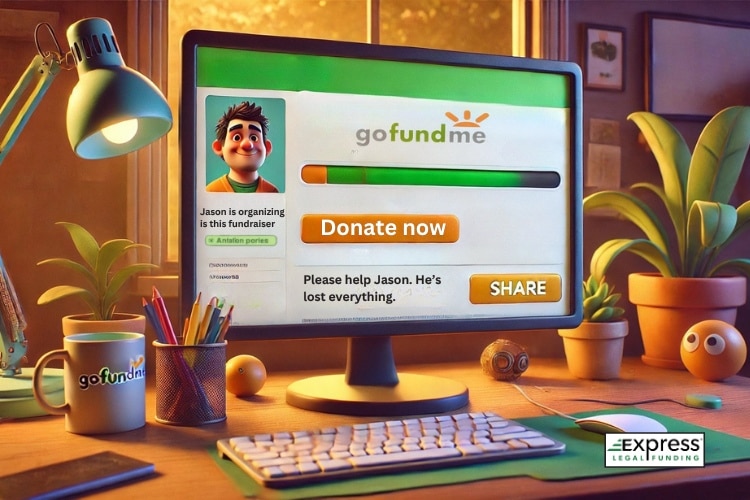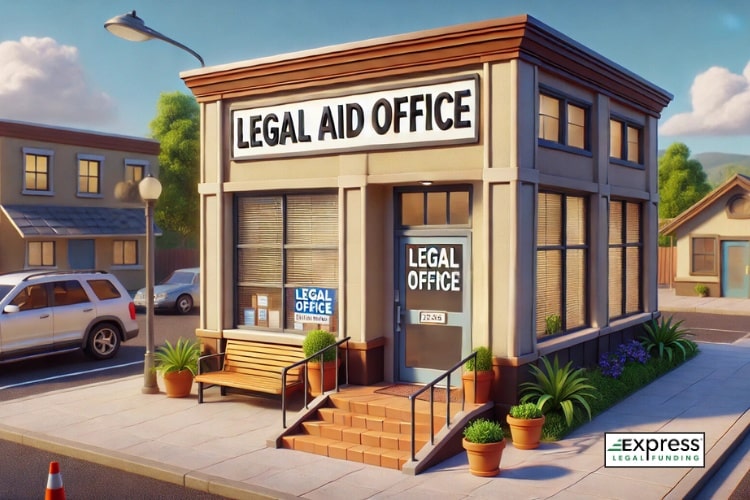
Regardless of the side you are on, facing a lawsuit can be financially draining, and while lawsuit loans offer a quick cash solution to plaintiffs, they often come with high fees.
Fortunately, there are numerous alternatives that can provide financial relief to plaintiffs without the drawbacks of traditional lawsuit loans.
This article explores 15 lawsuit loan alternatives, detailing their pros, cons, and application processes to help you make an informed decision.
What Are Lawsuit Loans?
Lawsuit loans provide upfront cash during a pending legal case. However, they often include high fees, unclear terms, and repayment obligations—even if you lose your case. That’s why exploring alternatives can lead to safer, more affordable solutions.

What are alternatives to lawsuit loans?
Best Alternatives to Lawsuit Loans
- Pre-Settlement Funding
- Personal Loans
- Credit Card Cash Advances
- Borrowing from Friends or Family
- Crowdfunding Platforms
- Home Equity Loan or HELOC
- Free Legal Aid or Nonprofit Assistance
- Disability or Workers’ Compensation Benefits
- Payment Deferrals or Negotiations
- Peer-to-Peer Lending
- Structured Settlement Advances
- Religious or Community Assistance
- Low-Interest Medical Loans
- Short-Term and Part-Time Work
- Accept Early Settlement Offer
1. Pre-Settlement Funding
Pre-settlement funding is a non-recourse lawsuit cash advance offered to plaintiffs based on the value of their legal case. It is not a loan, meaning repayment is only required if you win your case. The funds can be used to cover essential living expenses, medical bills, or other financial needs while awaiting a settlement.
✅ Apply for a Risk-Free Pre-settlement Advance Today

Pre-settlement Funding Pros and Cons
Pros:
- Non-recourse funding: No repayment required if you lose.
- Quick access to funds.
- No credit checks or upfront fees.
Cons:
- Higher fees compared to traditional personal loans.
How to Apply for Pre-settlement Funding:
- Contact a trusted company like Express Legal Funding.
- Submit an online or phone application.
- Provide your attorney’s contact information.
- The funding company will review your case, and if approved, funds can be sent within 24 hours.
Real-World Example of Getting Pre-settlement Funding:
An Amazon delivery driver injured in a car accident is waiting for their lawsuit to settle. They can’t work due to injuries and are struggling to pay rent and medical bills.
By applying for pre-settlement advance on their car accident case through Express Legal Funding, they receive $5,000 within 24 hours, helping them cover these expenses without risking her financial future. If they loses her case, they don’t have to pay back any money to Express Legal Funding for the non-recourse advance.
However, if the claim is successful, Express Legal Funding must be paid what it is owed for the contingent claim it has on the case proceeds.
Apply for Your Risk-Free Lawsuit Loan Alternative Today
2. Personal Loans
Personal loans are unsecured loans offered by banks, credit unions, or online lenders. They typically have fixed repayment terms and are based on your credit score and income. They’re ideal for individuals with good credit who need predictable payment plans.

Personal Loans Pros and Cons
Pros:
- Fixed repayment terms.
- Lower interest rates for those with good credit.
Cons:
- Requires strong credit and steady income.
- Increases personal debt.
How to Apply for a Personal Loan:
- Research lenders offering personal loans through banks, credit unions, or online platforms.
- Compare rates, terms, and requirements.
- Prepare documents like proof of income and a credit report.
- Submit an application and await approval.
Real-World Example of Getting a Personal Loan:
A construction worker injured on the job applies for a $10,000 personal loan from their local credit union. With a solid credit history, they secure the installment loan at a 7% interest rate, allowing them to cover living expenses while pursuing a workers’ compensation claim. They are required to make monthly payments to repay the loan.
3. Credit Card Cash Advances
A credit card cash advance allows you to withdraw cash against your credit limit. While convenient, it often comes with significantly higher interest rates and fees than other options, making it less favorable for long-term financial needs.

Credit Card Cash Advances Pros and Cons
Pros:
- Fast access to cash.
- No separate application process.
Cons:
- High Interest Rates: Cash advance APRs typically range from 24% to 30%, much higher than most personal loans or pre-settlement funding.
- Fees: A cash advance fee is usually 3%-5% of the amount withdrawn. For example, a $1,000 advance could cost $30-$50 upfront.
- Immediate Interest Accrual: Unlike regular credit card purchases, cash advances start accruing interest from the day of the transaction.
- Can reduce available credit for other expenses.
How to Apply for a Credit Card Cash Advance:
- Use your credit card at an ATM or bank branch.
- Be aware of cash advance fees (usually 3%-5% of the amount).
- Monitor repayment to avoid accruing high interest charges.
Real-World Example of Getting a Credit Card Cash Advance:
Timothy, a freelance photographer, uses a $1,000 credit card cash advance to pay rent. He incurs a $40 fee and a 29% APR, resulting in $330 in interest over a year if not paid off quickly. A pre-settlement funding advance for the same amount could save him money, as it doesn’t accrue interest at the same rate or require repayment if he loses his case.
4. Borrowing from Friends or Family
Borrowing from friends or family can provide interest-free or low-interest financial support. However, it’s crucial to manage the arrangement carefully to avoid misunderstandings or strained relationships.

Borrowing from Friends or Family Pros and Cons
Pros:
- Potential for no interest or fees.
- Flexible repayment options.
- Borrowing money without collateral.
Cons:
- Can damage personal relationships if repayment is delayed or forgotten.
- Lack of formal terms can lead to disagreements.
How to Borrow Money from Friends or Family:
- Discuss your financial needs openly and honestly with a trusted friend or family member.
- Agree on repayment terms to avoid misunderstandings.
- Put the terms in writing, even for informal agreements.
Tips for Maintaining Relationships:
- Be Transparent: Clearly explain why you need the funds and how you plan to repay them.
- Set Terms in Writing: Formalize the agreement, including repayment amounts, timelines, and any interest rates, to avoid misunderstandings.
- Communicate Regularly: Keep your lender informed about your progress and repayment status.
- Start Small: Only borrow what you genuinely need to minimize risk to the relationship.
Real-World Example of Getting a Loan from Family:
A young father injured in a workplace accident borrows $3,000 from his brother to cover his child’s daycare expenses. They agree on a repayment plan with monthly installments, avoiding financial strain on their relationship.
5. Crowdfunding Platforms
Crowdfunding involves raising money through online platforms like GoFundMe or Fundly. It’s a particularly effective option for personal injury cases, where compelling stories of hardship and loss can attract donations.

Crowdfunding Platforms Pros and Cons
Pros:
- No repayment required.
- Platforms like GoFundMe can reach wide audiences.
Cons:
- Requires effort to promote your campaign.
- Success is not guaranteed.
How to Use Crowdfunding Platforms:
- Choose a crowdfunding platform like GoFundMe or Fundly.
- Create a compelling story explaining your need for funds.
- Share the campaign on social media and with your network to increase visibility.
Real-World Example of Using GoFundMe for Medical Bills:
A cyclist injured in a hit-and-run accident starts a GoFundMe campaign to cover medical bills and lost wages. By sharing their story and updates on social media, they raise $15,000 in donations within three months.
6. Home Equity Loan or HELOC
Home equity loans and home equity lines of credit (HELOC, pronounced Hee-lock) let homeowners borrow against the equity in their property as collateral. These options are considered second mortgages and offer lower interest rates but carry the risk of foreclosure if payments aren’t made.

Home Equity Loans Pros and Cons
Pros:
- Low interest rates.
- Large borrowing potential.
Cons:
- Risk of foreclosure if unable to repay.
- Requires homeownership and significant equity.
How to Apply for a Home Equity Loan:
- Contact your bank or mortgage lender to check eligibility.
- Provide proof of homeownership and income.
- Get your home appraised to determine its equity.
- Choose between a lump sum loan or a line of credit (HELOC).
Real-World Example of Getting a HELOC:
Martha, a retired school teacher, is undergoing a prolonged medical malpractice case. She takes out a $20,000 HELOC to cover legal expenses and pay for a medical expert. She uses her home as collateral and secures a low interest rate due to her high equity.
7. Free Legal Aid or Nonprofit Assistance
Legal aid organizations and nonprofits provide free or low-cost legal and financial assistance to individuals who meet income and eligibility requirements.

Pros and Cons of Free Legal Aid
Pros:
- Free or low-cost resources for eligible individuals.
- May include financial and legal help.
Cons:
- Limited availability and strict eligibility criteria.
How to Apply for Free Legal Aid:
- Research local or national organizations like The Legal Aid Society or LawHelp.org.
- Check their website for eligibility requirements.
- Submit an application online or visit a local office.
Real-World Example of Obtaining Free Legal Aid:
A single mother unable to afford a lawyer receives help from a local legal aid society to fight a wrongful eviction case. While they don’t provide direct financial support during lawsuits, they connect her with a nonprofit that helps cover rent.
8. Disability or Workers’ Compensation Benefits
Workers’ compensation benefits replace a portion of lost wages for employees injured on the job. Disability benefits through Social Security (SSDI) provide financial assistance for long-term or permanent disabilities.

Workers’ Compensation or SSDI Benefits Pros and Cons
Pros:
- Provides steady income replacement for injured individuals.
- Often available for personal injury or workplace cases.
Cons:
- Lengthy application process.
- May not cover all expenses.
How to Apply for Workers’ Compensation or Disability Benefits:
- File a claim with your employer’s insurance carrier (for workers’ compensation).
- Visit the Social Security Administration (SSA) website to apply for disability benefits.
- Provide medical records and proof of inability to work.
Real-World Example of Getting Workers’ Compensation Benefits:
A warehouse worker sustains a back injury while lifting heavy equipment. After filing a workers’ compensation claim, they begin receiving bi-weekly payments that cover 70% of their lost wages. They will not be required to pay this back since the funds are benefit payments and not a loan.
9. Payment Deferrals or Negotiations
Payment deferrals allow you to delay or reduce bills temporarily. Negotiating payment plans with creditors can help ease financial pressure without taking on new debt.

Negotiating Deferred Payments or Plans Pros and Cons
Pros:
- Temporary financial relief.
- Avoids new debt.
Cons:
- May result in penalties or increased payments later.
- Not a long-term solution.
How to Negotiate a Payment Plan with Creditors:
- Contact creditors or service providers directly.
- Explain your financial situation and request a deferral or modified payment plan.
- Confirm new terms in writing to avoid future disputes.
- Get help from a certified financial counselor to assist you with a personalized debt management plan.
Real-World Example of Negotiating a Payment Plan:
A man facing eviction negotiates with his landlord to defer rent payments for two months, agreeing to pay an additional $100 per month until the deferred amount is covered.
10. Peer-to-Peer Lending
Peer-to-peer lending platforms like LendingClub and Prosper connect borrowers directly with individual investors. These loans often have competitive interest rates and flexible terms.

Peer-to-Peer Loans Pros and Cons
Pros:
- Competitive interest rates.
- Easier application process than traditional loans.
Cons:
- Requires good credit.
- Approval can take longer than other options.
How to Apply for a Peer-to-Peer Loan:
- Sign up on platforms like LendingClub or Prosper.
- Create a borrower profile with financial details.
- Review loan offers from individual investors and accept one that meets your needs.
Real-World Example of Getting a Peer-to-Peer Personal Loan:
Howard, a community college professor recovering from a workplace injury, borrows $8,000 through LendingClub to cover medical bills. With a solid credit score, he secures a 9% interest rate, making the loan more affordable than many other traditional lending options.
11. Structured Settlement Advances
If you’re receiving a structured settlement, you can sell part of your future payments for immediate cash. This provides short-term financial relief but reduces your long-term income. It’s typically used for urgent medical expenses or other pressing financial needs.

Structured Settlement Advances Pros and Cons
Pros:
- Access future settlement payments immediately.
- Useful for individuals already receiving settlements.
Cons:
- High fees and reduced long-term financial security.
- Selling a structured settlement must get court approval, typically taking several weeks.
- Limited availability for non-structured cases.
How to Apply for a Structured Settlement Advance:
- Contact a structured settlement buyer like JG Wentworth or Peachtree Financial.
- Provide details about your settlement, including payment schedule and amounts.
- Review offers and negotiate terms before finalizing the agreement.
Real-World Example of Selling a Structured Settlement:
Laura, a car accident victim, is receiving $1,500 monthly through a structured settlement but needs $10,000 immediately for surgery. She sells her future payments to cover the medical costs for a lump sum payment, sacrificing some long-term financial stability for immediate relief.
12. Religious or Community Assistance
Faith-based organizations and community groups often provide financial assistance for rent, utilities, or food. Eligibility and funding amounts vary depending on the organization, but they are a valuable resource for those in need.

Religious or Community Assistance Pros and Cons
Pros:
- Free financial support for those in need.
- Local availability through faith-based organizations or United Way.
Cons:
- Limited funding amounts.
- May have strict eligibility criteria.
- Some organizations, such as The Salvation Army, may require adherence to their religious principles or participation in specific programs to access support
How to Apply for Assistance from Religious or Community Nonprofits:
- Reach out to local churches, mosques, synagogues, or community centers.
- Provide documentation showing financial need or hardship.
- Follow the specific application process of the organization offering assistance.
Real-World Example of Getting Financial Assistance from a Church:
An injured landscaper receives $500 in rent assistance from a local church. They also provide free groceries for his family, helping him reduce overall financial strain during his recovery. Repayment is generally not required in these circumstances as the assistance comes from charitable funds.
13. Low-Interest Medical Loans
Medical loans are specialized financing options offered by healthcare providers or third-party lenders to cover medical expenses. They often feature lower interest rates than credit cards and can help spread out the cost of treatment over time.

Low-Interest Medical Loans Pros and Cons
Pros:
- Designed specifically for healthcare-related expenses.
- Often have lower interest rates than credit cards.
Cons:
- Requires credit approval.
- Limited to medical expenses.
How to Apply for a Low-Interest Medical Loan:
- Check with your healthcare provider to see if they partner with medical loan companies like CareCredit or Prosper Healthcare Lending.
- Submit an application with proof of income and credit history.
- Use the loan exclusively for approved medical expenses.
Real-World Example of Getting a Low-Interest Medical Loan for Surgery:
Juanita, a young woman recovering from an infected dog bite injury, secures a $4,000 medical loan through CareCredit to pay for reconstructive surgery. She takes advantage of a 0% interest rate for the first 12 months, making the loan affordable and manageable.
14. Short-Term and Part-Time Work
For those with access to a car, scooter, or bicycle, making deliveries through platforms like Uber Eats provides a quick and flexible solution.
Alternatively, online platforms such as TaskRabbit, GigSmart, and Upwork connect individuals with a variety of gig opportunities, allowing them to choose tasks that align with their schedule and physical capabilities.

Short-Term and Part-Time Gigs Pros and Cons
Pros:
- Generates immediate income.
- No interest or repayment involved.
Cons:
- May not be feasible if you’re recovering from injuries.
- Limited earning potential.
How to Apply for a Short-Term or Part-Time Gig:
- Sign up on platforms like TaskRabbit or GigSmart to find local opportunities.
- Use your existing skills to apply for short-term or freelance work.
- Negotiate flexible hours to accommodate your legal case or recovery needs.
Real-World Example of Getting a Short-Term Gig to Help with Income:
A rideshare driver named Alex is injured in an accident and takes a temporary online tutoring job through Upwork while he is unable to drive his car, which is in the repair shop. The additional income helps cover medical co-pays and groceries while they await their case settlement.
15. Accept Early Settlement Offer
Negotiating an early settlement provides immediate funds but often results in a smaller payout than waiting for the case to settle fully. This option is most suitable for plaintiffs with urgent financial needs or those who want to avoid prolonged litigation.

Accepting an Early Settlement Offer Pros and Cons
Pros:
- Provides immediate access to settlement funds.
- Reduces the stress and uncertainty of waiting for litigation to conclude.
Cons:
- Typically results in a lower payout than waiting for a full settlement.
- May weaken negotiation leverage for future settlements.
How to Accept an Early Settlement Offer for Your Claim:
- Discuss the possibility of an early settlement with your attorney.
- Review any offers made by the opposing party.
- Decide if the tradeoff between immediate funds and the potential payout is worth it.
Real-World Example of Accepting a Settlement Offer Early Due to Financial Pressure:
A plaintiff named Mary was injured in an apartment complex slip-and-fall case. Against the advice of her personal injury attorney, she chooses to accept a $20,000 settlement offer instead of waiting for trial. The funds allow her to pay off medical bills and avoid further financial stress, even though they may have received a higher amount by waiting, as the apartment management company’s insurance policy limit is $1,000,000.
In Summary About the Best Lawsuit Loan Alternatives for Plaintiffs
These 15 alternatives offer safer, more affordable options than traditional lawsuit loans. Pre-settlement funding, personal loans, and crowdfunding each have unique advantages tailored to different financial situations.
Pre-settlement funding, in particular, balances speed, risk-free repayment, and affordability, making it a viable choice for many plaintiffs. Consider consulting with financial advisors or legal professionals to choose the best option for your needs.
Why Choose Pre-settlement Funding?
Pre-settlement funding offers a balance of speed, risk-free repayment, and affordability. Unlike lawsuit loans, companies like Express Legal Funding provide transparent, cost-effective solutions to help plaintiffs navigate financial challenges during their cases.
FAQs on Lawsuit Loans and Legal Settlement Funding Alternatives

What is pre-settlement funding, and how does it differ from lawsuit loans?
Pre-settlement funding is a non-recourse cash advance provided to plaintiffs based on the potential value of their legal case. Unlike traditional lawsuit loans, pre-settlement funding does not require repayment if you lose your case. This makes it a less risky option for individuals awaiting a settlement.
Do I have to repay pre-settlement funding if I lose my case?
No, you do not have to repay pre-settlement funding if you lose your case. This is because it is a non-recourse advance, meaning the repayment obligation is contingent on winning the case.
How much money can I get with pre-settlement funding?
The amount you can receive with pre-settlement funding depends on the estimated value of your case. Typically, funding companies offer a percentage of the expected settlement amount, which can vary based on the specifics of your case.
How long does it take to get approved for pre-settlement funding?
Approval for pre-settlement funding can be quick, often within 24 to 48 hours after submitting your application and necessary documentation. The speed of approval depends on the complexity of your case and the responsiveness of your attorney.
Can I use pre-settlement funding for everyday expenses like rent or groceries?
Yes, pre-settlement funding can be used for everyday expenses such as rent, groceries, medical bills, and other financial needs while you await your settlement.
What are the advantages of pre-settlement funding over personal loans?
Pre-settlement funding offers several advantages over personal loans, including no credit checks, no monthly repayment obligations, and no repayment if you lose your case. This makes it a more accessible and less risky option for individuals with pending lawsuits.
How does crowdfunding work, and is it successful for legal cases?
Crowdfunding involves raising money through online platforms by sharing your story and financial needs with a broad audience. It can be successful for legal cases, especially if the story resonates with potential donors. However, success is not guaranteed and requires effort to promote the campaign.
Which alternative provides the fastest access to funds?
Pre-settlement funding and credit card cash advances typically provide the fastest access to funds. Pre-settlement funding can be approved within 24 to 48 hours, while credit card cash advances are available immediately through ATMs or bank branches.
Are credit card cash advances a good option for lawsuit expenses?
Credit card cash advances can provide quick access to funds, but come with high interest rates and fees. They may be suitable for short-term needs, but can become costly if not repaid promptly.
Is it better to negotiate an early settlement or wait for a higher payout?
Negotiating an early settlement provides immediate funds but often results in a lower payout. It may be beneficial for those with urgent financial needs, but waiting for a higher payout could be more advantageous in the long run. Consulting with your attorney can help determine the best course of action.
Are there any hidden fees associated with pre-settlement funding?
Reputable pre-settlement funding companies should disclose all fees upfront. However, it’s essential to read the terms carefully and ask questions to ensure you understand any potential costs involved.
What are the risks of borrowing from family or friends for legal expenses?
Borrowing from family or friends can strain personal relationships, especially if repayment terms are not clearly defined. It’s crucial to formalize the agreement in writing to avoid misunderstandings.
How much of my settlement will I lose by taking an early settlement offer?
The amount you lose by taking an early settlement offer depends on the terms negotiated. Typically, early settlements result in a lower payout than waiting for the case to settle fully. It’s important to weigh the immediate financial relief against the potential long-term loss.
What documents do I need to apply for pre-settlement funding?
To apply for pre-settlement funding, you’ll typically need to provide your attorney’s contact information, details about your case, and any relevant legal documents. The funding company will work with your attorney to assess the case’s value.
How do I find a reputable pre-settlement funding company?
To find a reputable pre-settlement funding company, research online reviews, check for transparency in terms and fees, and consult with your attorney for recommendations. Risk-free lawsuit funding companies like Express Legal Funding are known for their fair practices and high customer satisfaction.



